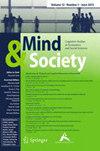真理的勇气:精神分析的共鸣和对圣雄甘地的反思
Q1 Arts and Humanities
引用次数: 0
摘要
本文试图在甘地哲学与精神分析学之间建立一种密切的认知联系。本文试图理解甘地(Satyagraha)所采用的“真理方法”与精神分析作为一种技术之间的伦理情感联系,两者都热情地致力于追求有意识/无意识的真理。两者都是基于对原始感觉、恐惧和人类不断挣扎的、无处不在的内在心理冲突的诚实探索。一些著名的精神分析思想家,如Erik Erikson, AshisNandy, SudhirKakar和许多其他人,将利用精神分析对甘地的见解,探索Satyagraha的伦理和政治层面,以定位其真理的心理意义。这篇论文,作为对甘地和他对真理的探索的颂歌,将帮助我们理解甘地价值观背后的心理特征,以及它最大的变革潜力。埃里克森指出,Satyagraha的一个心理组成部分是自我分析与试图理解他人内心冲突的关键意义。其次,对于甘地来说,对抗敌人(内部和外部)的方法是基于接受自己作为一个人也分享他人的内在机制的纯粹非暴力的。因此,我们发现一种心理上的相互联系和一体的观念渗透在人类的意识中。最后,本文将强调个人与政治领域的不分离,这是甘地人生哲学的标志,迄今为止,它是独一无二的。本文章由计算机程序翻译,如有差异,请以英文原文为准。
The Courage of Truth: Psychoanalytic Resonances and Reflections on Mahatma Gandhi
The paper attempts to establish an intimate and epistemic connection between the philosophy of Gandhi and Psychoanalysis. The paper seeks to understand ethico-affective connection between the ‘truth methods’ employed by Gandhi (Satyagraha) and psychoanalysis as a technique, both passionately devoted to the quest of conscious/ unconscious truths. Both have been based on honest explorations of primal feeling, fears, and ever pervading intra psychic conflicts that humans constantly grapple with. The ethical and political plane of Satyagraha will be explored to situate its psychological significance of truth, using the psychoanalytic insights on Gandhi, by some eminent psychoanalytic thinkers such as Erik Erikson, AshisNandy, SudhirKakar and many others. The paper, as an ode to Gandhi and his explorations of truth, will help us understand its psychological characteristics underlying Gandhian values and its power of greatest transformative potential. One such psychological components of Satyagraha, identified by Erikson, was the critical significance of self-analysis paired with an attempt to understand another man’s inner conflicts. Secondly,how for Gandhi, the methods of confrontation with the enemy ( internal and external) was purely non-violent based on the acceptance of oneself as a person who also shares other’ s inner mechanisms. Thus, we find an idea of psychological interconnected and oneness permeating the human consciousness. Lastly, the paper will highlight the non separation of personal and political realm, which is the marker of Gandhian life philosophy, unique as it has been so far.
求助全文
通过发布文献求助,成功后即可免费获取论文全文。
去求助
来源期刊

Mind and Society
Arts and Humanities-Philosophy
CiteScore
2.30
自引率
0.00%
发文量
5
期刊介绍:
Mind & Society is a journal for ideas, explorations, investigations and discussions on the interaction between the human mind and the societal environments. Scholars from all fields of inquiry who entertain and examine various aspects of these interactions are warmly invited to submit their work. The journal welcomes case studies, theoretical analysis and modeling, data analysis and reports (quantitative and qualitative) that can offer insight into existing frameworks or offer views and reason for the promise of new directions for the study of interaction between the mind and the society. The potential contributors are particularly encouraged to carefully consider the impact of their work on societal functions in private and public sectors, and to dedicate part of their discussion to an explicit clarification of such, existing or potential, implications.Officially cited as: Mind Soc
 求助内容:
求助内容: 应助结果提醒方式:
应助结果提醒方式:


